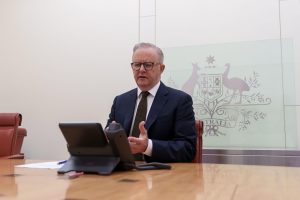The decision of the new U.S. administration under President Donald Trump to pause funding for the U.S. Agency for International Development (USAID) and place all direct hire personnel on administrative leave – bar a small number of specific life-saving projects – has implications beyond the operations of American NGOs working in international development. Obviously, it also has a devastating effect on the people who are reliant on this aid. But it also has created a crisis for other countries’ NGOs and international development programs – many of whom partner with USAID. A new set of calculations will be needed to work around the loss of the world’s largest international development donor.
It is cliché to state that a crisis creates opportunity, and no one should see this action by the Trump administration as anything other than disastrous for the communities that rely on this aid – especially the delivery of essential services. However, for Australia the new conditions within international development do present a set of choices that could ultimately be to its reputational benefit. To take advantage of this, Canberra needs to move quickly, and with intelligence and vision.
Obviously, Australia cannot compete with the amount of funds that the United States had previously dedicated to international development. Canberra’s aid budget is around one-tenth of what USAID’s was. Even in a region like the Pacific Islands, where Australia remains the largest overall donor, USAID’s recent $249 million annual contribution has been critical – and at least $75 million of this has been in partnership with Australian NGOs. This now leaves a number of projects in limbo, and significant slack to pick up. The region is watching with one eye on whether China chooses to open its wallet in response.
Of course, Australia doesn’t have to fill the void left by the United States alone. The opportunity presented here is also one of middle power cooperation in the international development space. Along with countries like Japan, South Korea, Canada, United Kingdom, and France, there is an opportunity for Australia to enhance joint initiatives within the Indo-Pacific – and create new ones – to build greater resilience into the international development space.
There is clearly now a new and far more difficult landscape for international development assistance, but this landscape is one where middle powers will be required to demonstrate what their collective responsibility looks like in the wake of greater power abdication.
For reasons seemingly tied to the grievances of two men (Trump and his sidekick, billionaire Elon Musk), the U.S. is now seeking to dismantle the international order that it created and prospered from. As Aris Roussinos wrote in Unherd last week, “Rather than posing as their moral and strategic opposite, America is becoming more like China and Russia – a regional great power whose statecraft is increasingly amoral and purely self-interested.”
This self-interest seems personal, rather than national. Or if it is to be seen as national it is narrow and myopic, without any understanding of how reputation is central to statecraft, or how prosperity and security is something shared, not taken from one state to another.
The order that Washington now seeks to dismantle has not only been beneficial to the United States. A great many other countries, like Australia, have prospered and advanced from it. This includes those developing countries that may be yet to reach middle or high income status but have made great strides toward these goals in recent decades. International development assistance has played its part in this advancement – with its work built on an understanding of shared prosperity and security.
For Australia, a new world where this understanding is being abandoned by its most powerful proponent is a daunting one. But it something that Canberra cannot simply accept without challenge. Australia may lack heft in both financial and human resources, but it does have the ability to be a strategic organizer, to think about what the world looks like without any U.S. involvement in the international development space, and then actively work with its partners to shape a response that can make the best out of these new conditions.
In a world where the great powers are disinterested in trust, there’s a lot of trust now on the table for middle powers like Australia to pursue. Being a country that steps up in areas where the United States has abandoned its role can reap a huge reputational dividend. It requires being nimble and flexible, understanding where assistance is now most pressing, and directing resources toward these areas. Long term, this new reality may mean narrowing the focus of development assistance toward its most essential programs.
At its core, international development is built on a belief that all countries deserve the same living standards as countries like Australia. Those countries with the capability to assist in advancing these living standards have a responsibility to do so. From this responsibility flows a recognition that the world is also a far safer and more secure place when poverty and disadvantage are minimized. The United States may currently believe it has the ability to abandon these principles, but this only heightens the need for Australia and other like-minded states to commit themselves to them.

































